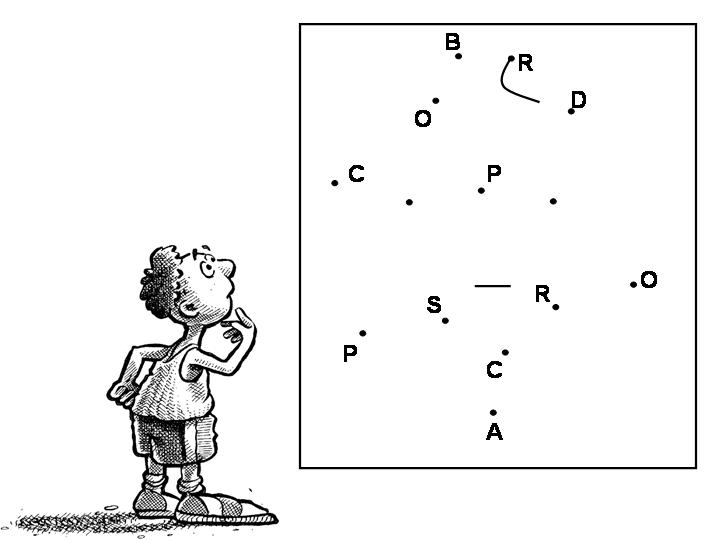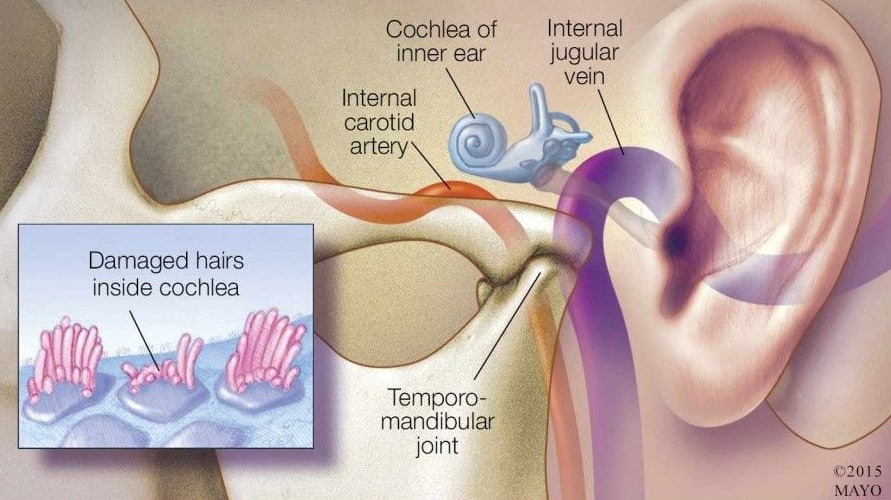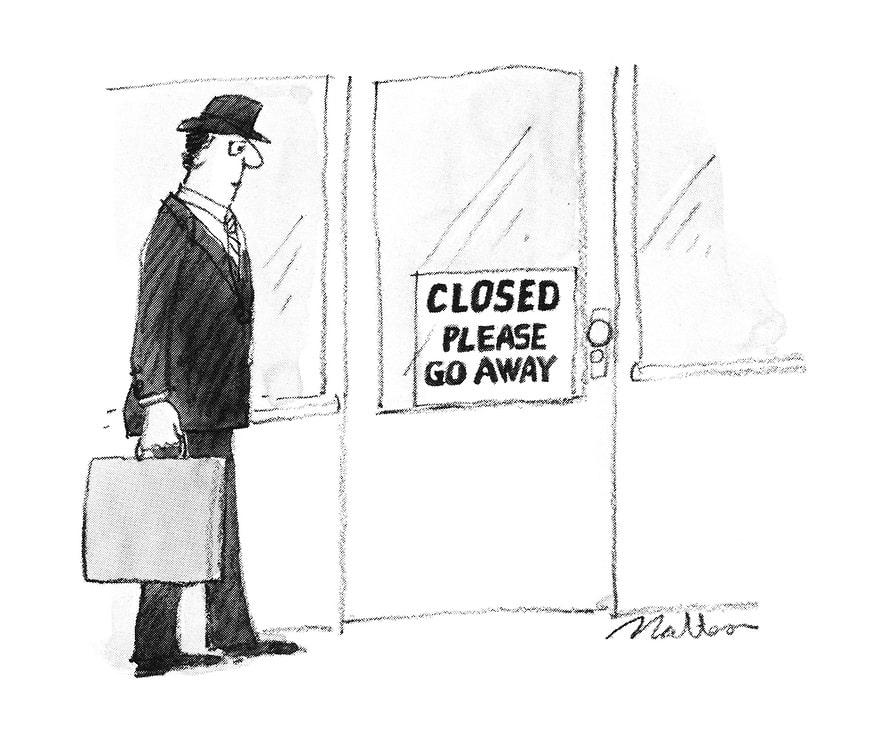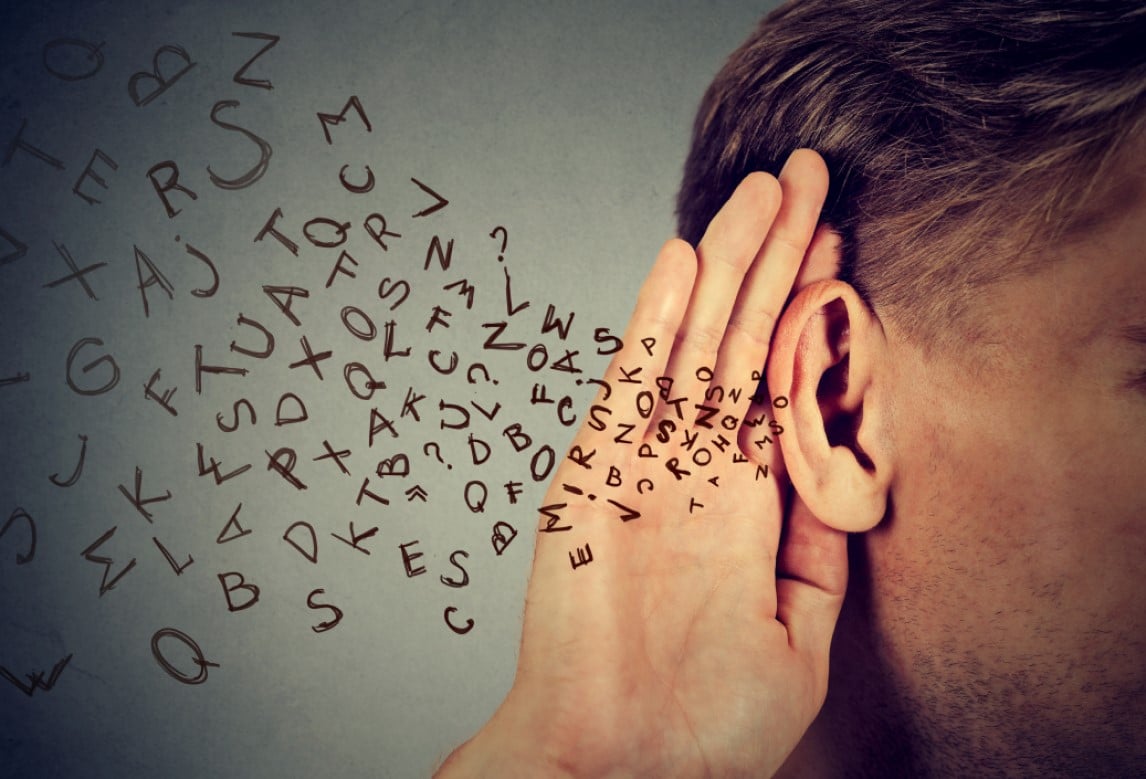Tinnitus is an ear condition that most people describe as ear ringing. If you ever said to yourself, gosh that’s annoying, how do I stop my ears from ringing? You know first-hand how difficult it is to find tinnitus relief. But if that’s the case, you owe it to yourself to consider the possibility of TMJ ear pain and tinnitus.
As a TMJ specialist, a large percentage of patients that I see have TMJ dysfunction, but a large percentage of those same patients also have ear pain and tinnitus. See the connection? The astonishing thing is that most people don’t know that their ear symptoms may be a sign of TMJ dysfunction. So yes, that nagging ear pain or ringing that’s been bothering you for quite some time may be improved once you connect the dots.
In this article I’ll tell you my tips and tricks of how to stop ear ringing. I’ll also point you in the right direction of how to go about finding proper treatment. But first, let’s discuss why tinnitus and TMJ are related.
TMJ Ear Pain: Connecting the Dots between TMJ, Ear Pain, & Tinnitus

If I were to tell you that your earache and tinnitus is related to your jaw, you would probably think I’m pulling your leg. Trust me, I get that reaction from people quite often. Most people wonder, How could an earache be caused by my jaw?
And then it’s like a light bulb goes off. The reality is the hinges of the jaw, called the TMJs, are on either side of the skull, and guess what? The TMJ is about 0.5cm from the middle ear.
The key concept to understand is that its less of a matter that TMJ dysfunction causes ear ringing or earaches, and it’s more of a matter of geography. The cause is due to the proximity of the TMJ to the ear, and also, because the ear is highly innervated. The sensation feels like it is your ear, but the pain can sometimes be caused by inflammation around the joint of the jaw.
What is TMJ?
TMJ pain most commonly refers to pain from Temporomandibular joint dysfunction. The temporomandibular joints are the hinges that connect the jaw to each side of the head. Most commonly you hear people refer to it as TMJ because people love three letter acronyms.
The condition of TMJ dysfunction affects as much as 70% of the population, and about 12% of the world population have symptoms severe enough to affect their every day life.
Here’s the thing about TMJ pain that makes it so complex. The origin of the pain can be from several different sources. Because the head and neck has so many structures in a small area, it can sometimes be difficult to pinpoint exactly where pain is coming from.
The concept of TMJ dysfunction is complex, but I will simplify it for you. Think of the jaw as a hammock swinging out of balance. If a hammock is swinging out of balance, the strain lands at the hinges. And it doesn’t stop there. If you think of the temporomandibular joint has hinges, the strain doesn’t only stay at the hinges. It transfers strain to surrounding structures. The surrounding structures are the muscles, the ligaments, the sides of the skull, and yes, you guessed it…the ears.
Because unbalanced jaw function distributes strain throughout the head, this is why pain can show up in many forms from TMJ. A patient with TMJ dysfunction can have headaches, ear pain, ear aches, muscle pain, jaw fatigue, etc. If you didn’t know it, you would never expect so many symptoms to be all linked to how your jaw is functioning.
What is Tinnitus and TMJ Ear Pain?

Okay so right off the bat, I want to get this out of the way. “Tinnitus pronunciation,” is one of the highest googled questions about the ear. I didn’t expect to begin like this, but apparently… people really would like to know. Tinnitus is pronounced “Tin – it – tus.” So there you have it. If you need to discuss it with your physician or dentist, you can be a linguist expert. Okay, onward and upward.
Tinnitus is the feeling of noise or ringing in the ears. And it is a pretty common symptom throughout the world. Tinnitus affects about 20 to 25 percent of the world population. Notice how I said symptom, and not disorder. Tinnitus is a symptom of an underlying condition. It’s not a condition on its own. Let’s look at what causes ear ringing.
You have to understand there are two reasons you can hear ear ringing. It can either be subjective or objective. What I mean by that is it can be a noise in your ear that only you can hear (subjective), or it can be a sound that actually can be identified and found on examination by a doctor (objective). The reason this is important is that it helps to determine the source. Subjective tinnitus can be caused by problems in the inner, middle, or outer ear. Most notability it can also be caused by the way the nerves of the ear are processing sound. Objective tinnitus is more of a true sound within the area. It can be a blood vessel condition, middle ear problem, bone condition, and yes, ear ringing can be caused by inflammation from the TMJ which lies adjacent to the middle ear.
Ear pain is a similar story to tinnitus. The most common cause of earaches is infection, but there are a variety of other inner and middle ear conditions that could arise. When there is a condition of the ear that causes pain, it is called a primary ear problem. Primary ear problems are true ear conditions. However, there are also a number of secondary conditions that contribute to earaches. Temporomandibular joint dysfunction is one of them.
The TMJ and muscles are innervated by the same nerves that innervate the ear. Therefore, if you are having muscle pain of your jaw, it can easily refer pain down the nerve to the ear. Think of the ear and the jaw muscles as sharing the same nerve highway. When you share the same highway, if there is an accident caused by something else, it affects your commute. That’s basically how referred pain from the jaw to the ear works. The ear isn’t the source, but it feels like it. The ear and the TMJ are simply two separate structures that are linked by an information highway.
Other Common Causes of Ear Problems
There are a number of causes of tinnitus and ear problems. We’ll go though some of the most common. Here’s the thing, as with anything, you can’t be upset about things you cannot control. Let’s focus on the most common causes of ear problems, particularly the causes that you can easily prevent.
- Wisdom teeth and Ear Pain: You bet I put this one first. You’re probably guessing because I’m a TMJ dentist. That’s true, but nope. I put this first because it is by far one of the most common sources of ear pain on the planet. If a patient has a painful erupting lower wisdom tooth, you can pretty much bet that pain in their jaw…. is also radiating to the ear. Wisdom teeth and ear pain are related. An erupting wisdom tooth or an infected wisdom tooth are one of the most common causes of ear pain. The same goes for other dental infections on the lower jaw. They all can refer pain to the ear. If you are having ear pain, particularly around the age of 15 to 25 years old, have a dentist check your wisdom teeth.
- Exposure to loud noise: Your ears are designed to hear. It makes perfect sense that loud noises would damage them overtime. It’s like trying to tug a Carnival cruise ship with a row boat. Not designed for that kind of load. Be careful to limit routine use of heavy equipment, attending loud concerts, or listening to portable music excessively loud.
- Earwax blockage: Earwax is one of those things we often wonder why humans even have it. Well its pretty simple. Earwax protects your ear canal by trapping dirt and limiting bacterial growth. Not a glamorous job that ear wax has. However, when the earwax is excessive it can create a blockage or irritation of the ear. Blockage and irritation create pain and the sensation of tinnitus.
- High blood pressure: Remember how we discussed that the blood vessels in your ear can create a swishing sound or create pressure on the nerves? High blood pressure, also called hypertension, is often the underlying medical condition. Have your physician review your blood pressure and any medications you are currently taking to see if it can be improved. Try to eat healthier by limiting fats and sugars, and maintain a healthy exercise schedule.
Does Tinnitus Go Away?

It’s all about the underlying causes. For example, for somone who has tinnitus after going to a loud concert, you may have tinnitus for a couple days that dissipates on its own. However, if there are more severe underlying causes, then you can understand that stopping ringing in your ear should be a priority. The bottom line is, if your tinnitus continues for more than a couple of weeks and negatively affects your quality of life, you should have it looked at. So that naturally leads people to the question of, “when doesn’t tinnitus go away?” This is rare but it happens in rare instances when the cause is rooted in neurology or permanent ear damage. Reducing your exposure to the cause of the tinnitus is critical for full recovery.
How to Relieve TMJ & Find TMJ Ear Pain Relief
Let me just break it down for you of what you should try first to try to relieve ear pain and find tinnitus relief. If there is no relief after a week or two of trying these tips, you should seek a professional. I’ll discuss more on that in the very next section of this article.
- Get Your Nutrition Right: Studies show that deficiency of some vitamins and minerals can lead to tinnitus. In one study, lack of zinc contributed to ear ringing. In another study, lack of B-12 supported cause of tinnitus. And as we talked about high blood pressure contributes to blood swishing briskly through the blood vessels of the ear that can create the sensation of ringing. The point is nutrition can contribute to tinnitus in a variety of ways. Review your diet to make sure it’s well balanced, and low in salt, sugar, and saturated fats. Also, be sure to take the recommended dose of a daily multivitamin to rule out vitamin deficiency.
- Exercise consistently as your doctor recommends: Studies have show that moderate regular exercise can reduce the severity of tinnitus. And when I saw exercise, I do mean cardiovascular exercise. However, I also mean, try to stretch your jaw periodically throughout the day to help reduce tension on your jaw to rule out if jaw tension is contributing. Overall, exercise helps your body to rest better when you sleep, and it helps to reduce blood pressure. All of these support the effort for tinnitus relief.
- De-stress: As if we need to tell you to destress. Yes tinnitus can be related to stress. Its easier said than done, but try to de-stress by remaining calm, reduce excessive fatigue when working, maintain a healthy sleep schedule, and practice things like meditation or yoga.
- Review Your Daily Routines: If you are having ear ringing, try to see if there are certain times of the day when it flares up. There may be some habit of your day or postural positioning that is contributing. Keep an eye on how you are sitting and standing, and if there are any repetitive motions at work that might be creating muscle tension of the head and neck.
What to do next?

The takeaway point is that if you are having tinnitus or ear pain for more than 1-2 weeks it is important to followup with a specialist. If your symptoms are only isolated to your ear without any jaw pain, it might be best to first see your primary care physician who may refer you to an ENT also known as an otolaryngologist, or they may potentially refer you to an audiologist. These are the experts of the ear and a good place to start. The ENT will rule out if there is a true ear condition or if there are secondary conditions contributing.
If your physican determine you do not have a primary ear condition, then the next step you should consider is to have a consult with a dentist or a TMJ specialist. Now remember, the TMJ dysfunction is complex. Not all dentists are as well versed with TMJ, so it is important to do your research or have your general dentist recommend a referral to a TMJ expert in your area.
The TMJ specialist will evaluate your jaw, teeth, and muscles evaluate how your jaw function may be contributing to your tinnitus. Your TMJ may or may not be the sole cause of your ear condition, but if there are factors from your TMJ that could be contributing it is best to treat them to rule out how much affect it is having on your ear condition.
Some common treatments to treat TMJ and get tinnitus relief are a fabrication of a custom orthotic appliance, orthodontics, restorative dentistry, or equilibrating your bite. I know there’s a lot of options, but you don’t have to worry about that now. Your TMJ specialist will be able to help guide you to be best recommendations. If you’d like to learn more about TMJ specifically and the treatments available you can read lots more here.


